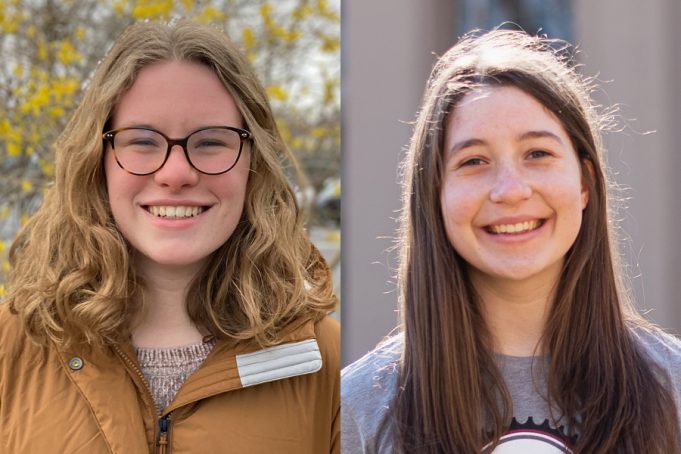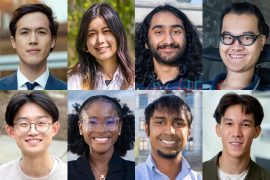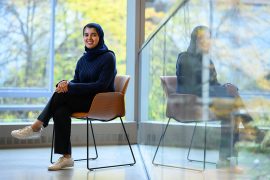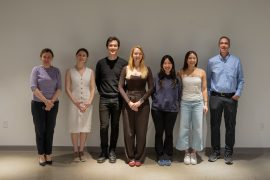Zoë Marschner and Charlotte Wickert named 2022-23 Goldwater Scholars

MIT undergraduates whose research areas explore artificial intelligence, space, and climate change honored for their academic achievements.
MIT students Zoë Marschner and Charlotte Wickert have been selected to receive a Barry Goldwater Scholarship for the 2022-23 academic year. Over 5,000 college students from across the United States were nominated for the scholarships, from which only 417 recipients were selected based on academic merit.
The Goldwater scholarships have been conferred since 1989 by the Barry Goldwater Scholarship and Excellence in Education Foundation. These scholarships have supported undergraduates who go on to become leading scientists, engineers, and mathematicians in their respective fields. All of the 2022-23 Goldwater Scholars intend to obtain a doctorate in their area of research, including the two MIT recipients.
Zoë Marschner, a third-year majoring in computer science and math, began working in the Geometric Data Processing Group with Professor Justin Solomon in 2020. Of Marschner’s research, Solomon says, “her work is easily on par with that of my most advanced graduate students — she is on track to become a leader in computer graphics and geometry processing research.”
For her part, Marschner describes geometry processing as “the coolest field in the world, since it lets you take interesting results from math and apply them to interesting problems in computer science. People see graphics all the time, such as in digital drawing programs or Pixar’s 3D animated movies, so it’s really a very far-reaching field.”
Current challenges in the field include hex mesh validity problems, which have to do with simulated shapes composed of cells shaped like deformed cubes: for a hex mesh to be valid, every point in every hex must have positive infinitesimal value, a condition which is extraordinarily difficult to verify. Shortly after joining Solomon’s group, Marschner developed an algorithm based on a sum-of-squares (SOS) relaxation that not only guaranteed hex validity, but also highlighted a range of invalid hex elements that prior state-of-the-art algorithms had classified as valid — a surprising and significant leap forward in the field.
“Formulating an SOS relaxation requires understanding a subject at the intersection of real algebraic geometry, convex optimization, and semidefinite programming, fields many students would not encounter until graduate school,” says Solomon. “Marschner, having had no prior exposure to these fields, quickly gained mastery of them by reading course notes and papers. By the end of the first month, she had translated this dense math and theory into functioning code and was able to show us working solutions to the hex validity problem.”
Notably, the junior has already had a paper accepted for publication by ACM SIGGRAPH Asia, showing how broadly applicable SOS programming will be in graphics, and has spent a summer working with Professor Alec Jacobson in the Dynamic Graphics Project at the University of Toronto. Looking toward the future, Marschner’s enthusiasm for her newfound field is palpable. “I hope to explore the ways in which interesting representations of data can elicit new and exciting applications in graphics. Someday, I hope to become a professor so that I can share my love for graphics with others.”
Charlotte Wickert is a third-year undergraduate double majoring in nuclear science and engineering and physics. Pursuing both disciplines allows her to develop a detailed theoretical knowledge base she can apply to nuclear science. She has been hooked on physics ever since reading a science fiction book about parallel universes and quantum mechanics in middle school. After arriving at MIT, her love for physics and interest in renewable energy led her to seek out the Department of Nuclear Science and Engineering. Soon, after, she joined associate department head and professor of nuclear science and engineering Benoit Forget’s Computational Reactor Physics Group as part of her Undergraduate Research Opportunities Program and was hooked again. As part of the group, she learned much about reactor physics and gained many research tools to assist her throughout her career. Wickert’s long-term goal is to continue working on nuclear energy and eventually teach as a research professor.
“I have had the pleasure of working with Charlotte for the past three years since she joined MIT and she has demonstrated creativity, intellectual curiosity, and an incredible work ethic,” says Forget. “Her work with graduate student Amelia Trainer on the physics of thermal neutron scattering has helped us improve the processing and sampling of current scattering models in high-fidelity radiation transport modeling and simulation tools.”
Most recently, Wickert has worked with material phonon distributions that describe how thermal neutrons excite vibrational nodes in materials. Many assumptions and shortcuts are currently used when dealing with various material phonon distributions, and the effects of these assumptions are not well documented. To analyze the consequences of these assumptions, two versions of a Beryllium phonon distribution were generated and refined; then were used to run simple reactor simulations with OpenMC. Analyzing the magnitude of the changes from various phonon distributions provides a precision threshold required for accurate simulations.
The Barry Goldwater Scholarship and Excellence in Education Program was established by the U.S. Congress in 1986 to honor Senator Barry Goldwater, a soldier and national leader who served the country for 56 years. Awardees receive scholarships of up to $7,500 a year to cover costs related to tuition, room and board, fees, and books.


